人教版高中英语必修一unit1 Friendship-grammar (直接引语与间接引语)教案
人教新课标英语必修一Unit1Friendship.Grammar
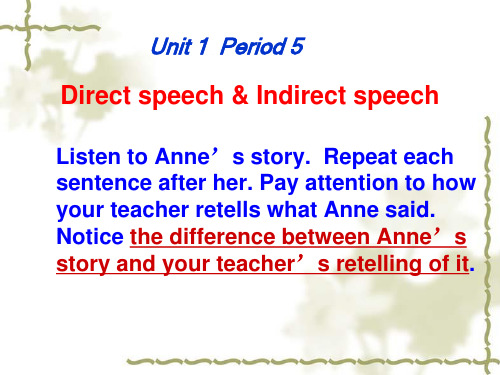
4. Her father asked her why she chose/ had chosen
her diary and old letters. 5. “Are you very hot with so many clothes on?”
Mother asked/said to her. 6. “What else have you hidden under your
2. Anne told her father that she had got tired of looking at nature through dirty curtains and dusty windows.
3. The girl said that she needed to pack up her things in the suitcase very quickly.
overcoat?” Margot asked her. 7. “ When shall we go back home?” Anne asked
her father. 8. “ Why did you talk so much to that boy?”
Father asked Anne.
Homework Finish the Exs on Grammar
Try to do SB P.5 Ex.2 Change the sentences either into direct speech
or indirect speech:
1. Anne said that she didn’t know the address of her new home.
Direct speech
S: My name is Anne Frank and my family is Jewish.
人教版高中英语必修1 Unit1 Friendship Grammar(共52张PPT)
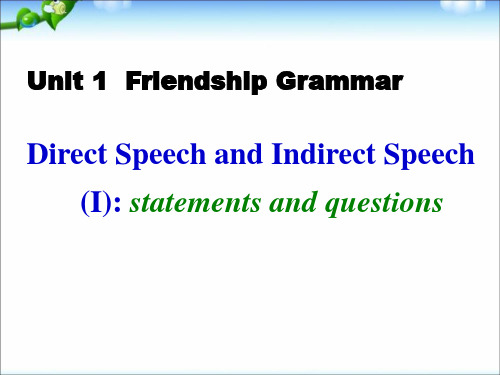
How to change direct speech into indirect speech?
a. Change what has been said to an object clause or an infinitive phrase;
2. 经常的习惯 He said to the doctor, “I smoke two packs every day.” → He told the doctor that he smokes two packs every day.
3. 历史事件 The teacher said, “World War II ended in 1945.” → The teacher said that World War II ended in 1945.
He said, “I lost a key here yesterday.” He said that he had lost a key there the day before/the previous day.
“I read the book here a week ago,” Jane said to him. Jane told him that she had read the book there a week before.
When do you harvest the wheat? (They asked him)
you harvest the wheat
They asked him when you harvest the wheat.
he harvveesstteedd
高中英语 Unit 1 Friendship Grammar课件1 新人教版必修1

③直接引语中有具体(jùtǐ)的过去某年、某月、某日作状语, 变为间接引语时,时态不变。如: Jack said. "I was born on April 2l, 1980."
第八页,共23页。
• 感叹句的间接引语 • 1.直接引语是感叹句变为间接引语时,多采用宾语
从句结构,既可用what或how引导,也可用that引导 。 • "What a clever boy you are!" my teacher said to him.-----• My teacher told him what a clever boy he was.-----or • My teacher told him that he was a very clever boy. • 2.有些感叹句可以根据原句的意思,采用适当的动 词(dòngcí)变为陈述句,不需要转述。 • Help! he cried.-----• He called for help.
• She told me that they were going to meet at the school gate.
• 规则之外还有特例!
第十七页,共23页。
注意:以下几种情况时态 不变 ①直接引语(yǐn yǔ)是客观真理。
The teacher said "The earth moves around the sun .” → The teacher said that the earth moves around
第七页,共23页。
Pay attention! 5. 英语中有些疑问句并非提出疑问,而是表示请求、
劝告、建议等。这种疑问句变为间接引语时,往往 采用其他的形式(xíngshì)。往往采用suggest doing, advise sb to do, ask sb to do...等句型。 “What about having a drink?" he asked.----he asked what ...... He suggested having a drink. "Will you please bring your reference book here tomorrow?" she said to me. She asked me to take my reference book there the next day.
Unit 1 Friendship Grammar课件-高一上学期英语人教新课标必修一

11
新课讲解
三、指示代词、时间状语、地点状语及动词的变化
词类 指示代词
时间 状语
直接引语 this these now ago today
tonight yesterday
间接引语 that those then
before/earlier that day that night
the day before
9
新课讲解
二、直接引语变间接引语时时态的变化
直接引语 一般现在时 现在进行时 现在完成时
间接引语 一般过去时 过去进行时 过去完成时
现在完成进行时
过去完成进行时
一般将来时 一般过去时 过去完成时
过去将来时 过去完成时 过去完成时
10
新课讲解
二、直接引语变间接引语时时态的变化
12
新课讲解 三、指示代词、时间状语、地点状语及动词的变化
时间状语 地点状语
动词
tomorrow the day after tomorrow
here come bring
the next/following day in two days' time there go take
13
新课讲解
四、句子结构的变化
[名师点津]
直接引语是客观真理、谚语和格言, 时态无变化的情况 My teacher said to us yesterday,“Early birds catch worms.” (直接引语是谚语) →My teacher told us yesterday that early birds catch worms. (变成间接引语时态不变)
1.直接引语是陈述句,变为间接引语时,常变成由that引导的 宾语从句。在口语中that可以省略。 2.直接引语是一般疑问句、选择疑问句或反意疑问句时,间接 引语中用whether(...or...或...or not)或if引导。
人教版高一英语必修一+Unit+1+FriendshipGrammar课件+(共24张PPT)

He asked me whether/if I would go abroad or stay in Beijing.
here
there
She said to me,”I lived there five years ago.”
She told me she had lived there five years before. She said to me,”I will see her next week.” She told me she would see her the next week.
She says, “Miss liu is good at English.” She says Miss liu is good at English.
He said, “ Where there is a will,there is a way. ”
He said that where there is a will,there is a way.
He asked her, “You have passed the eaxm, haven’t you?” He asked her whether/if she had passed the exam.
The visitor ___that he ___very glad to visit our country.
❖ A. said ; was ❖ C. told ; was
B.said ; had been D.spoke ; had been
新课标人教版必修一 Unit1 Grammar

Step 2: Deal with 课本P5 Ex2
1. Anne said (that) she didn’t know the address of her new home. 2. Anne told her father (that) she had got tired of looking at nature through dirty curtains and dusty windows. 3. The girl said that she needed to pack up her things in the suitcase very quickly. 4. His father asked her why she had chosen her diary and old letters. 5. Mother said to her : “ Are you very hot with so many clothes on ?” 6. “What else did you hide under your overcoat ?” Margot asked her. 7. “When shall we go back ?” Anne asked her father. 8. “ Why did you talk so much to this boy ?” Father asked Anne.
2012-12-12
2. She suffered from loneliness, but she had to learn to like it there. 她遭受孤独的折磨,但是她得学会喜欢呆在那里。 suffer vt. 遭受;忍受;经历,后面常接pain, defeat, loss, poverty, hunger等名词。 vi.受痛苦,患病。常用suffer from结构。 ① Iraq suffered serious damage from the war. 伊拉克因战争而遭受了严重的破坏。 ② He is suffering from cancer. 他患上了癌症。 3. How can Linda recover from her illness in this room ? 琳达在这个房间里怎么能够从病中康复呢……? recover vi.& vt. 痊愈;恢复;重新获得,常与介词from 连用。 ① I think he will recover from her bad cold soon. 我想不久他的重感冒会好的。 ②Jane recovered her lost wallet. 简找到了丢失的钱包。
高中英语:Unit 1 Friendship Grammar(新人教必修1)
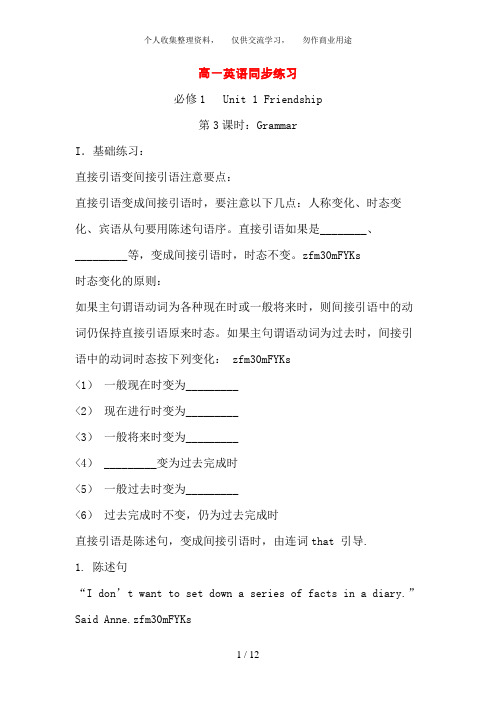
高一英语同步练习必修1 Unit 1 Friendship第3课时:GrammarI.基础练习:直接引语变间接引语注意要点:直接引语变成间接引语时,要注意以下几点:人称变化、时态变化、宾语从句要用陈述句语序。
直接引语如果是________、_________等,变成间接引语时,时态不变。
zfm30mFYKs时态变化的原则:如果主句谓语动词为各种现在时或一般将来时,则间接引语中的动词仍保持直接引语原来时态。
如果主句谓语动词为过去时,间接引语中的动词时态按下列变化: zfm30mFYKs<1)一般现在时变为_________<2)现在进行时变为_________<3)一般将来时变为_________<4) _________变为过去完成时<5)一般过去时变为_________<6)过去完成时不变,仍为过去完成时直接引语是陈述句,变成间接引语时,由连词that 引导.1. 陈述句“I don’t want to set down a series of facts in a diary.”Said Anne.zfm30mFYKs______________________________________直接引语是一般/选择疑问句,变成间接引语时,由连词whether或if 引导.2. 一般疑问句He asked, “Are you leaving tonight?”______________________________________直接引语是特殊疑问句,变成间接引语时,由相应的疑问词who, whom, whose, how, when, why, where 等引导。
zfm30mFYKs3. 特殊疑问句“When did you go to bed last night?” father said to Anne. zfm30mFYKs______________________________________代词等一般地应作相应的变化:指示代词 this ---that ; these--- those表示时间的词 now --- then ; today--- that day; thisweek(month ,etc> ----that week (month ,etc>; yesterday ----the day before;last week(month> --- the week(month> before;three days(a year>ago---three days (a year> before; tomorrow ----the next (following > day;next week(month> —- the next(following> week (month>zfm30mFYKs表地点的词 here --there动词 bring -- take ; come --goII. 单项填空:1. He said, "I am living with my brother." He said that __ was living with his brother. zfm30mFYKsA. IB. youC. heD. they2. He said, "You are sure to get a warm welcome there."zfm30mFYKsHe said that we _____ sure to get a warm welcome there. zfm30mFYKsA. amB. wasC. wereD. are3. She says, "Something is wrong with my bike."She says that something is wrong with _____ bike.A. myB.aC. hisD. her4. He said, "I will not do so again."He said that he _____ not do so again.A. willB. mustC. wouldD. do5. The teacher said, "My son had the same experience as the little boy." zfm30mFYKsThe teacher said that his son had _____ the same experience as the little boy. zfm30mFYKsA. beenB. haveC. hadD. done6. She said to me, "My mother took me to an exhibition yesterday." zfm30mFYKsShe told me that her mother had taken _____ to an exhibition the day before. zfm30mFYKsA. sheB. meC. herD. you7. You said to me, "I saw the film two days ago."You told me that you had seen the film _____A. two daysB. two days beforeC. two days agoD. yesterday zfm30mFYKs8. He said to his younger sister, "You may come with me." zfm30mFYKsHe told his younger sister that _____ with him.A. you may comeB. you might comeC. she might comeD. she might go zfm30mFYKs9. The student said to me, "She has made a close study of the problem." zfm30mFYKsThe student told me that she _____ a close study of the problem. zfm30mFYKsA. has makeB. have madeC. had makeD. had made zfm30mFYKs10. He said, "I live here."He said that he lived ______A. thereB. hereC.in thereD. at there11. The reporter said that the UFO _____ east to west when be saw it. zfm30mFYKsA.was travelling B.travelled C.had been traveling D.was to travel.zfm30mFYKs12. I wonder why Jenny _____ us recently. We should have heard from her by now. zfm30mFYKsA.hasn't written B.doesn't write C.won't write D.hadn't writtenzfm30mFYKs13. It is said in the book that Thomas Edison (1847-1931> _____ the world leading inventor for sixty years .zfm30mFYKsA.would be B.has been C.had been D.was 14. I _____ you not to move my dictionary---now I can’t find it. zfm30mFYKsA askedB askC was askingD had askedIII. 改错练习:1. He asked me why he has not received the letter.____________________________________2. Peter asked his mother where she was going next day. zfm30mFYKs____________________________________3. She told me that she had sent an e-mail about tenminutes ago.___________________________________zfm30mFYKs4. He asked how did you went there the day before yesterday. zfm30mFYKs____________________________________IV. 请选出正确的答案:1.“You’ve already got well, haven’t you?” she asked.→She asked _____zfm30mFYKsA. if I have already got well, hadn’t youB. whether I had already got wellC. have I already got wellD. had I already got well.2. He asked , “ Are you a Party member or a League member?”→He asked me _____zfm30mFYKsA. am I a Party member or a League memberB. was I a Party member or a League memberC. if was I a Party member or a League memberD. whether I was a Party member or a Leaguemember.zfm30mFYKs3. He asked, “How are you getting along?”→He asked_____zfm30mFYKsA. how am I getting alongB. how are you getting alongzfm30mFYKsC. how I was getting alongD. how was I getting alongzfm30mFYKs4. He asked me _____ with me.A. what the matter isB. what the mater wasC. what is the matterD. what was the matter5. He said, “Don’t do that again.” He _____ me_____ that again.zfm30mFYKsA. said to; not to doB. said to; don’t doC. told; don’t doD. told; not to do6. Can you make sure _____ ?A. that he will come here todayB. when he will come here todayzfm30mFYKsC. will he come here todayD. whether will he come here todayzfm30mFYKs7. Do you happen to know _____ ?A. where is her addressB. in which place is her addresszfm30mFYKsC. what her address isD. the place her address iszfm30mFYKs8. Excuse me, but can you tell me _____ ?A. where can I get to the libraryB. where I can get to the libraryzfm30mFYKsC. how can I get to the libraryD. howI can get to the libraryzfm30mFYKs9. John asked me _____to visit his uncle’s farm with him.zfm30mFYKsA. how would I likeB. if or not would I likezfm30mFYKsC. whether I would likeD. which I would likezfm30mFYKs10. I’d like to know _____ Chinese.A. when he began to learnB. when did he begin to learnzfm30mFYKsC. when did he begin learningD. for how long he began to learn zfm30mFYKsV. 将下列句子变为间接引语:11. Mr. Wang said, “I will leave for Shanghai on business next month, children”zfm30mFYKs→ Mr. Wang told _______ that he_______leave for Shanghai on business __________.zfm30mFYKs12. “I haven’t heard from my parents these days,” said Mary.zfm30mFYKs. → Mary said that _____ _________ from her parents________ days.zfm30mFYKs13. The geography teacher said to us, “The moon moves around the earth and the earth zfm30mFYKsgoes round the sun.”→The geography teacher told us that the moon ______ around the earth and the earth _______ round the sun.zfm30mFYKs 14. “Have you anything interesting I can read, George?”she said. zfm30mFYKs→ She asked George ____he _____ anything interesting______ could read.zfm30mFYKs15. “Where are you going?” the father asked his son.zfm30mFYKs→ The father asked his son where _______going.16. “Don’t make so much noise in class, boys and girls,”said the teacher. zfm30mFYKs→ The teacher _____the boys and girls _____make so much noise in class.zfm30mFYKsVI. 把下列句子变为直接引语:17. She asked whether I would be free the next day ornot.zfm30mFYKs→ She asked , “ ______ will be free ______, won’t_____?”zfm30mFYKs18. I asked her where she was going and what she was going to do the next day.zfm30mFYKs→ I asked her, “Where______going and what ______ going to do ________?”zfm30mFYKs19. His father told him not to climb that high tree in his new coat.zfm30mFYKs→ His father said, “______ climb this high tree in_______ new coat.”zfm30mFYKs20.She said that she would finish her work the nextday.zfm30mFYKs→“_______ finish my work ________,” she said.答案:I.基础练习:填空: 客观事实、普遍真理,(1> 一般现在时变为一般过去时<2)现在进行时变为过去进行时<3)一般将来时变为过去将来时<4)现在完成时变为过去完成时<5)一般过去时变为过去完成时直接引语变间接引语.1. Anne said that she didn’t want to set down a series of facts in a diary.zfm30mFYKs2. He asked us whether we were leaving that night.3. Father asked Anne when she went to bed the night before. zfm30mFYKsII、单项填空1-5 CCDCC 6-10 CBDDA 11-14 AADAIII. 改错练习:1. has改为had2.在next前加the3. ago 改为before4. 去didIV. 请选出正确的答案:1-5 BDCDD 6-10 ACDCAV. 将下列句子变为间接引语:11.Mr. Wang told the children that he would leave for Shanghai on business the next monthzfm30mFYKs12.Mary said that she hadn’t heard from her parents those days.zfm30mFYKs13.The geography teacher told us that the moon moves around the earth and the earth goes round zfm30mFYKsthe sun.14.She asked George if he had anything interesting she could read.zfm30mFYKs15.The father asked his son where he was going.16.The teacher told the boys and girls not to make so much noise in class.zfm30mFYKsVI. 把下列句子变为直接引语:17.She asked , “ You will be free tomorrow, won’t you?”zfm30mFYKs18.I asked her, “Where are you going and what are you going to do tomorrow?”zfm30mFYKs19.His father said, “Don’t climb this high tree in your new coat.”zfm30mFYKs20.“I’ll finish my work tomorrow,” she said.申明:所有资料为本人收集整理,仅限个人学习使用,勿做商业用途。
必人教新课标必修一 Unit1 Friendship-Grammar[Period 3]
![必人教新课标必修一 Unit1 Friendship-Grammar[Period 3]](https://img.taocdn.com/s3/m/7b88f353b307e87101f696ba.png)
Warming Up
Direct speech S: My name is Anne Frank and my family is Jewish. T: She said ___________ that her name was ___ Anne Frank and ___ her family was ___ Jewish. Indirect speech
Bring
Task 4
Adverbial of time
Direct Speech Now Today Yesterday This week/month/year Last week/month/year Three days ago Tomorrow
Indirect Speech
Task 1 Sentence structure
II Grammar Study
1. Look at the sentences in Exercise 1 of your Student’s Book on page 5. Work in pairs and identify the difference between direct speech and indirect speech in the sentences. Differences: Verb tenses Pronoun forms Word order Adverbials of time
IV Homework
1. Do WB P.42 Ex.1 2. Review the rules of the changes from direct speech into indirect speech.
Verb
This place These places Come Bring Borrow
新编人教版高中英语必修1教案: Unit1Friendship Grammar 教案(系列五) Word版
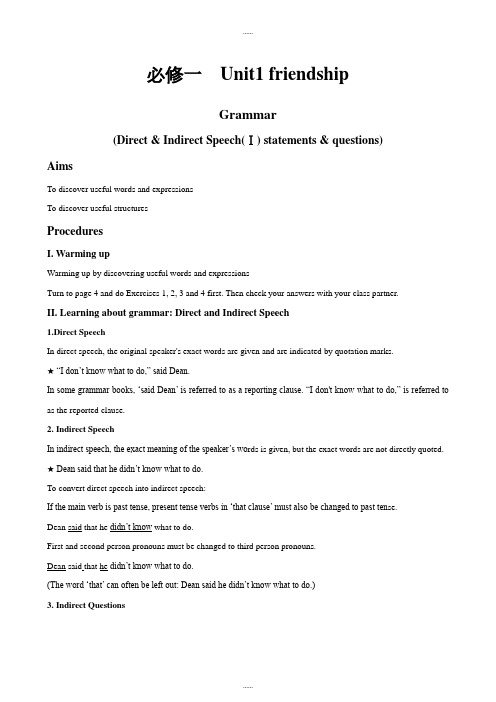
必修一Unit1 friendshipGrammar(Direct & Indirect Speech(Ⅰ) statements & questions)AimsTo discover useful words and expressionsTo discover useful structuresProceduresI. Warming upWarming up by discovering useful words and expressionsTurn to page 4 and do Exercises 1, 2, 3 and 4 first. Then check your answers with your class partner.II. Learning about grammar: Direct and Indirect Speech1.Direct SpeechIn direct speech, the original speaker's exact words are given and are indicated by quotation marks.★“I don’t know what to do,” said Dean.In some grammar books, ‘said Dean’ is referred to as a reporting clause. “I don't know what to do,” is referred to as the reported clause.2. Indirect SpeechIn indirect speech, the exact meaning of the speaker’s wo rds is given, but the exact words are not directly quoted. ★Dean said that he didn’t know what to do.To convert direct speech into indirect speech:If the main verb is past tense, present tense verbs in ‘that clause’ must also be changed to past ten se.Dean said that he didn’t know what to do.First and second person pronouns must be changed to third person pronouns.Dean said that he didn’t know what to do.(The word ‘that’ can often be left out: Dean said he didn’t know what to do.)3. Indirect QuestionsThe same rules apply to indirect questions as to indirect statements. The difference is that a wh- clause is used instead of a that clause.In telling a story or recounting events, a speaker using direct speech has all the resources of intonation to produce a lively account. Because indirect speech is always speech reported by someone else, the account is more reserved and restrained.The ability to change direct speech into indirect speech is a useful skill for those engaged in taking the minutes of a meeting or reporting on events.III. Discovering words and expressionsDo exercises 1, 2, 3 and 4 on page 4 and 5. Check your work with your partner’s.IV. Discovering structuresDo exercise 1 and 2. Check your work with your partner’s.。
英语:unit1friendship-grammar课件(新人教必修1)

直接引语和间接引语耨怏上貝 補失3?聆崔0S3;«»-29WBJ» 沬方 AirttaJE 出龙根M 播般*丈. .生Kif^mwss. d »Xr 傑ICtSSi*箒 Fin»tt^解折菲尔■廉 13il3TA15«WftBffiKfl. Ifl 扎的M2 俺&水中鶯的九丼億力S ffi•a.Kc.Bi*•貳“仙在璃中»i»X 源姿曲疋屮魁7]扌便釣PttfffiMTfF»-®iFA5手更菱信 srji-亍mi?才亀嗾・Bit OW»HhtH 人f 1.伺力尺H -34IBRXM•feO(«^12 07A tjs^jf^iaea 1) «*« e« 也 -…丫“I have a long body and long arms, a gift and love for swimming.”Phelps said he had a long body and long arms, and a gift and love for swimming.“I started swimming at anyoung age in order to treatmv ADHD disease.59 Phelps said he had started swimming at an young age in order to treat his ADHD disease.“I receive a 5-hour training every day."Phelps said he received a5-hour training everyday.“I always desire to be the winner, to win gold medals and to break world records•”Phelps said he alwaysdesired to be the winner, towin gold medals and tobreak world records.“One of my favorite things is to compete with the best swimmers in the world•”Phelps said one of his favorite things was to compete with the best swimmers in the world.“I have many goals, and all of them are high.”Phelps said he had many goals, and all of them were high・“I will always try my best to be Phelps No ・l・"Phelps said he would alwaystry his best to be Phelps No.l.Secrets of Phelps' success?gift interest determination courage hard workambiti on直接引语:直接引用别人的原话,并在原话前后加引号。
高一英语Unit_1_Friendship_grammarPPT课件[人教版高中必修1]
![高一英语Unit_1_Friendship_grammarPPT课件[人教版高中必修1]](https://img.taocdn.com/s3/m/d888123443323968011c9281.png)
Homework
Review the knowledge of direct speech and indirect speech and summarize the rules.
Thank
you
Sentence pattern for commands: Do…/ Do not do…. Sentence pattern for requests: Do…please./ Can you do…?/ Could you do… ?/ Will you do…?/ Would you do…? Will you do…?/ Would you do…? Then if we want to change them into indirect speech, we should do like this: Commands : sb. Told/ordered sb.(not) to do sth Requests : sb. Asked sb else (not) to do sth
Change these sentences into Indirect Speech.
He said to me : “Don’t smoke in this room.” He said to me : “Could you please help me with my work?”
Change the following sentences into Direct Speech. The landlady asked him to put his coat in the closet. closet. move. The young father told his children not to move. Mother told me to lock the door after midnight. midnight.
Unit1FriendshipGrammar-课件-2020-2021学年高中英语人教版必修一

观察下列几组句子中直接引语与间接引 语的转化规律,然后加以总结。 1. A. My son said, “I want to go to the
store.” → My son said that he wanted to go to the
store. B. I said to Jack, “You didn’t tell me what
2. A. “Are you ready?” the teacher asked Tim.
→ The teacher asked Tim if / whether he was ready.
B. He asked John, “Were you playing basketball at this time yesterday?”
before,” said he. seen her before.
现在完成进行时
过去完成进行时
He said, “I have been He said he had
doing it for hours.” been doing it for
hours.
直接引语(变化前) 间接引语(变化后)
一般过去时 “I saw her last Monday,” he said.
3. Mr. Black said, “I have walked a long way.”
Mr. Black said that _h_ehad walked a long way.
直接引语变间接引语时,间接引语的时 态要与主句的时态一致。
1. 主句为一般现在时, 现在完成时或一般 将来时的时候, 间接引语时态不变。
一般将来时
过去将来时
He said: “We shall He said they would
人教版高中英语必修一 教案: Unit1Friendship Grammar4
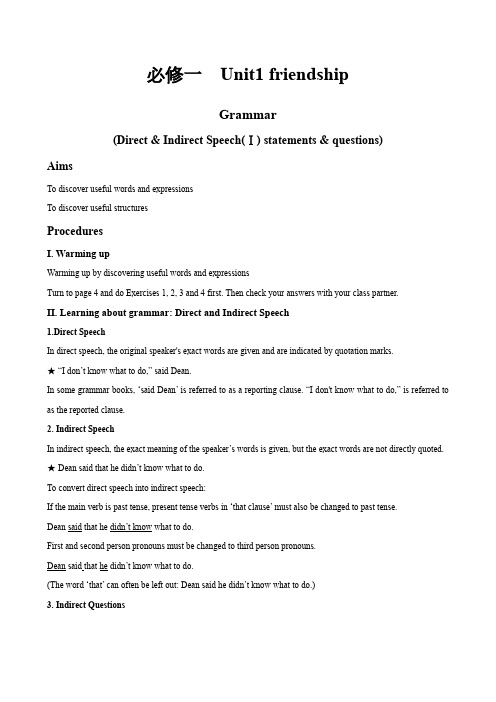
必修一Unit1 friendshipGrammar(Direct & Indirect Speech(Ⅰ) statements & questions)AimsTo discover useful words and expressionsTo discover useful structuresProceduresI. Warming upWarming up by discovering useful words and expressionsTurn to page 4 and do Exercises 1, 2, 3 and 4 first. Then check your answers with your class partner.II. Learning about grammar: Direct and Indirect Speech1.Direct SpeechIn direct speech, the original speaker's exact words are given and are indicated by quotation marks.★“I don’t know what to do,” said Dean.In some grammar books, ‘said Dean’ is referred to as a reporting clause. “I don't know what to do,” is referred to as the reported clause.2. Indirect SpeechIn indirect speech, the exact meaning of the speaker’s wo rds is given, but the exact words are not directly quoted. ★Dean said that he didn’t know what to do.To convert direct speech into indirect speech:If the main verb is past tense, present tense verbs in ‘that clause’ must also be changed to past ten se.Dean said that he didn’t know what to do.First and second person pronouns must be changed to third person pronouns.Dean said that he didn’t know what to do.(The word ‘that’ can often be left out: Dean said he didn’t know what to do.)3. Indirect QuestionsThe same rules apply to indirect questions as to indirect statements. The difference is that a wh- clause is used instead of a that clause.In telling a story or recounting events, a speaker using direct speech has all the resources of intonation to produce a lively account. Because indirect speech is always speech reported by someone else, the account is more reserved and restrained.The ability to change direct speech into indirect speech is a useful skill for those engaged in taking the minutes of a meeting or reporting on events.III. Discovering words and expressionsDo exercises 1, 2, 3 and 4 on page 4 and 5. Check your work with your partner’s.IV. Discovering structuresDo exercise 1 and 2. Check your work with your partner’s.。
Unit 1 Friendship-Grammar[人教新课标必修一课件]
![Unit 1 Friendship-Grammar[人教新课标必修一课件]](https://img.taocdn.com/s3/m/b72cb52d87c24028915fc3c4.png)
直接引语和间接引语
Michael Phelps
“I have a long body and long arms, a gift and love for swimming.”
Phelps said he had a long body and long arms, and a gift and love for swimming.
“I started swimming at an young age in order to treat my ADHD disease.”
Phelps said he had started swimming at an young age in order to treat his ADHD disease.
Exercise I
1. “I like reading adventure stories,” said John. John said that he liked reading adventure stories. 2. “I don’t like computers,” Sarah said to her friend. Sarah told her friends that she didn’t like computers.
2. We said to her, “They’re walking through the street now.” We told her that ___ through the street ___. A. we were walking…then B. you are walking…now C .they were walking…then D. they walking…now
人教版必修一_unit1_friendship

Grammar Study
Sentence structure
Interrogative (yes/no questions)
Direct speech Indirect speech
“Are you going Sam asked
to buy this coat?” Mary if she
Sam asked
Warming Up
Direct speech
S: After hiding here for a long time, I’ve become crazy about nature.
T: She s_a_i_d_t_h_a_t after hiding t_h_e_r_e_for a long time, sh_e_h_a_d__become crazy about nature. Indirect speech
was going to
Mary.
buy the coat.
Grammar Study
Sentence structure
Special Interrogative
Direct speech Indirect speech
“How can I
Jane asked me
solve the
how she could
Task 1 Direct Speech
Declarative
Sentence structure
Yes/No questions
Special questions
Indirect Speech
Task 2 Tense
Direct Speech Present Past Present perfect Past perfect Present continuous Future
- 1、下载文档前请自行甄别文档内容的完整性,平台不提供额外的编辑、内容补充、找答案等附加服务。
- 2、"仅部分预览"的文档,不可在线预览部分如存在完整性等问题,可反馈申请退款(可完整预览的文档不适用该条件!)。
- 3、如文档侵犯您的权益,请联系客服反馈,我们会尽快为您处理(人工客服工作时间:9:00-18:30)。
Friendship-grammar学案
人教版新课标必修一unit1 直接引语变间接引语
刘桂清
引述别人的话有两种方式:一是使用引号引出人家的原话,这叫做直接引语;一是用自己的话把人家的话转述出来,这叫做间接引语。
例如:
Tom said:“I am busy.”
汤姆说:“我很忙。
”(引号内是直接引语)
Tom said that he was busy.
汤姆说他很忙。
(宾语从句是间接引语)
一.如何变人称;
下面有一句顺口溜“一随主。
二随宾,第三人称不更新”。
“一随主”是指在直接引语变间接引语时,如果从句中的主语是第一人称或被第一人称所修饰。
从句中的人称要按照主句中主语的人称变化如:
She said:“My brother wants to go with me. ”→
“二随宾”是指直接引语变间接引语时,若从句中的主语及宾语是第二人称或被第二人你所修饰。
从句中的人称要跟引号外的主句的宾语一致。
如果引号外的主句没有宾语。
也可以用第一人称,如:
He said to Kate,“How is your sister now?”→
“第三人称不更新”是指直接引语变间接引语时。
如果从句中的主语及宾语是第三人称或被第三人称所修饰从句中的人称一般不需要变化如:
Mr Smith said,“Jack is a good worker.”→
二、如何变时态:
a.直接引语在改为间接引语时,如主句的谓语是现在时,从句的时态无需变化。
b.如主句的谓语是一般过去时,从句的谓语动词要做如下变化:
现在时它需改为过去时态;过去时态改为完成时;过去完成时则保留原来的时态。
如:
1)She said, "I have lost a pen."→She said she had lost a pen
2)She said,"We hope so."→She said they hoped so.
3) She said."He will go to see his friend."→She said he would go to see his friend.
但要注意在以下几种情况下。
在直接引语变为间接引语时,时态一般不变化。
①直接引语是客观真理。
He said,“Light travels faster than sound.”→
②直接引语是过去进行时,时态不变。
如:
Jac k said. "John, where were you going when I met you in the street?"→Jack asked John where he was going when he met him in the street。
③直接引语中有具体的过去某年、某月、某日作状语,变为间接引语时,时态不变。
如:Xiao Wang said,"I was born on April 2l, 1980。
" →Xiao Wang said he was born on Apri l 20, 1980。
④直接引语如果是一般现在时。
表示一种反复出现或习惯性的动作,变间接引语,时态不变。
如:He said, "I get up at six every morning." →He said he gets up at six every morning。
⑤如果直接引语中的情态动词,助动词已经是过去时的形式时,不再变。
如:
Peter said. "You had better come there today." →Peter said I had better go there that day。
三.如何变句型:①直接引语如果是陈述句,间接引语应改为由that引导的宾语从句。
如:She said, "Our bus will arrive in five minutes."→She said that their bus would arrive in five minutes.
②直接引语如果是祈使句,间接引语应改为"tell(ask, order, beg等) sb (not) to do sth."句型。
如:"Don‟t make any noise," she said to the children. →She told (ordered) the children not to make any noise. "Bring me a cup of tea, please," said she.→She asked him to bring her a cup of tea.
③直接引语是疑问句,变为间接引语时,要把疑问语序变为陈述语序。
a.直接引语如果是反意疑问句,选择疑问句或一般疑问句,间接引语应改为由whether或if 引导的宾语从句.如:He said, "Can you swim, John?" →
"You have finished the homework, haven…t you?" my mother asked. →My mother asked me
.
"Do you go to school by bus or by bike?" →He asked me if I went to school by bus or by bike.
b.直接引语如果是特殊问句,间接引语应该改为由疑问代词或疑问副词引导的宾语从句(宾语从句必须用陈述句语序)。
She asked me, "When do they have their dinner?"→ She asked me when they had their dinner.四.如何变状语。
